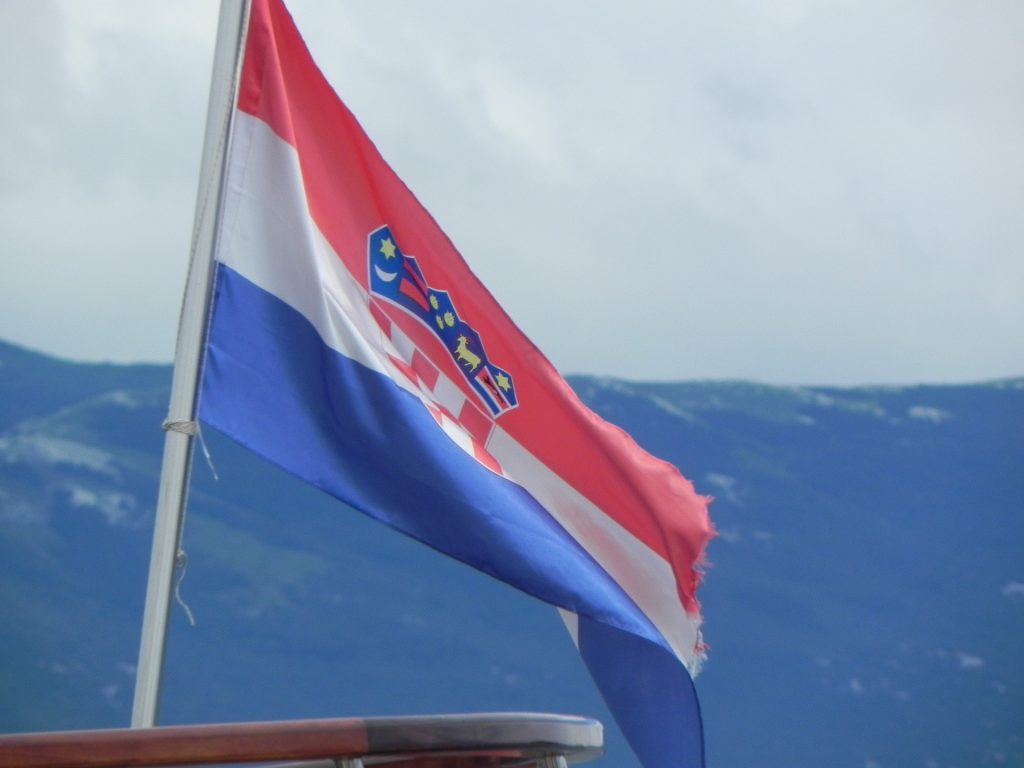May the 9th, 2024 – Is the Croatian language as impossible to learn as they say? It really depends on how you view it. A bigger question might be whether or not locals can understand each other when they speak it.
One of the most amazing experiences I have had as a parent so far was watching my eldest daughter learn to read at the age of four.
One day, she sat with all the letters, learned what the fuss was about, how to write and pronounce them. I was really impressive and the proudest father in the country.
“Come on then, Dad, test me. Give me a word to write.”
We started with simple words like ‘dobar dan.’ I was amazed at how quickly she produced the perfect answers. I tried something harder, the names of the towns and villages on Hvar – Jelsa, Vrboska, Pitve, Vrisnik. All perfect. Never being the most patient guy in the world, I tried something really hard – the word for patience.
S T R P LJ E N J E she wrote, without a moment’s hesitation.
Incredible, but it confirmed to me what I already knew – that Croatian is a totally phonetic language. What you see is what you get. The words may look complicated, but if you learn the 33 letters and how to pronounce them, there are no surprises.
“Now can you spell the English word for 8?” I asked, intrigued. She thought for a moment:
A J T
As it should be when you learn to read and write with the Croatian alphabet as your guide. She looked at me in horror when I showed her E I G H T.
“Your language is very stupid, Daddy.” You are not wrong there, kiddo.
Not only is Croatian the most phonetic language I have come across, it is also the most logical. This may surprise people, give that the Croatian language has a reputation for being incredibly difficult to learn. And I would agree that it is, if you are not versed in the structure of Slavic languages.
My baptism of fire with Slavic languages was Russian, which I studied at university in anticipation of becoming the MI6 bureau chief in Moscow. Getting a Western brain around Slavic languages after growing up on French, German, Latin and Ancient Greek took some effort, but my knowledge of the structure of Russian helped tremendously when I came to tackle Croatian. All the language structure issues were essentially the same, and it was just a case of learning the words, as well as the case endings for Croatian. All of these were totally regular once you learned about 10 execptions, all of which were applied without exception. Which mean that they were also very regular in a way.
Things like ‘k’ followed by ‘i’ always goes to ‘ci’ – Afrika but u Africi, and so on.
Learn the Slavic structure, those 10 or so exceptions and the Croatian alphabet, and you have the keys to the linguistic kingdom of the world’s most logical language. A battle-hardened, worldly-wise Esperanto for Slavs.
Except…
There are a couple of things that get ine way of this perfect story of the harmonious Croatian language – history, dialects and globalisation being three of them.
One of my favourite little-known facts about the Croatian language is one I learned while living on Hvar. On Croatia’s premier island, full-time population 11,000, there are 8 different dialect words for chisel, depending on which town or village you come from. The bigger joke back then was it was impossible to actually find a chisel even if you used all eight words.
When I started learning Croatian, I had about 6 private classes before I realised that I could teach myself the grammar after my Russian linguistic training, and pick up the vocabulary over conversation in the cafes. And all was going really well until I travelled one day to Zagreb to meet a client there who wanted to buy a house. He asked me what the selling price was.
“Petdeset mejorih,” I replied, my heart beating slightly faster as the prospect of an imminent sale.
This Purger had no idea what I was talking about. Eventually, I had to write down the figure of 50,000 euro so that he could understand. It turned out that I was speaking Jelsa dialect, a language I had become quite proficient in at the expense of learning proper Croatian over many beers on the pjaca. My word for ‘thousand’ was apparently understood only on Hvar, and the people of Brac would have looked at me equally as blankly, apparently. God knows what I would have ended up with I had ordered a thousand chisels in Hvar dialect.
Some of the Croatian dialects are totally impossible to understand, and there is even a case for questioning if parts of it can even be classified as language. Check out a common greeting in Dalmatia in the video above, the famous Dalmatian Grunt, as personified by Professor Frank John Dubokovich, Guardian of the Hvar Dialects.
These dialect differences cause real problems of understanding, and they often produce completely different sentences for the same meaning. In our previous series looking at Hvar dialects, check out the differences in these sample phrases of standard Croatian, The Professor’s Hvar dialect, and the Dubrovnik dialect of a visiting tourist in the video above.
Interestingly, these dialect differences have been preserved with emigration in some cases. Here is a comment from a recent thread in a Facebook group on the Croatian language in the diaspora:
And that is the magic of spoken Croatian. Here in New Zealand we have people from many parts of Croatia. All brought with them a particular dialect. My family from Korcula had two dialects, one from Lumbarda, and the other Zrnovo. Listening to people from other villages in Korcula is a treasure!. I’m mesmerised by the dialect from Brac! My husband’s family and friends from Drvenik were intrigued by my spoken dialect. Sadly, with education and media influences, the localised dialects will change. That is language for you!
Education, media influences and globalisation are all playing their roles in adding an additional level of comprehension issues to this most logical and phonetic language. As has recent history.
Serbian and Croatian languages have always been similar, but when the artificial country of former Yugoslavia was created, so too was an attempt to homogenise the langauges. The language of Serbo-Croat was born. Always a symbol of the hated communist regime, it did not take long for Croatians to revert back to some more traditional words, while a Tudjman era attempt to put linguistic distance between Croatian and Serbo-Croat generated many new words.
The Serbo-Croatian Oktobar, for example, was replaced by one of my favourite words to describe a time of year – listopad, which literally means ‘leaves falling’, a perfect way to describe October. Meanwhile, at Tudjman HQ, ‘aerodrom’ was being replaced by ‘zrackna luka’ (literally ‘air harbour/port’), ‘helikopter’ by ‘zrakomlat.’
The biggest changes, however, are coming from globalisation and the influence of the Englsh language. This actually started in the diaspora many decades ago, and a lot of the ‘Croatian’ that is spoken there is actually Croglish – a mixture of Croatian grammar and English words. Check out some of the gems in the New Zealand Croatian language lesson above, for example.
But real change to the Croatian language has come from the Internet age and the dominance of the English language. I am amazed listening to my kids hanging out with their friends. The language of Croatian is often not Croatian, but English. While I would expect that between my own kids, for them to be communicating that way with their classmates is interesting. Good news for the next generation regarding language skills in the global market, less so perhaps for the future of the Croatian language.
A few days ago, I overheard a conversation which included the sentence:
“Ja sam hezitajtala.” I hesitated. It was the first time that I had heard the such a use of the word hesitate in Croatian. And while it made things easier for me to understand as a foreigner, it made me wonder how the older generation of non-English speaking Croatians are managing to keep up with communications with the grandchildren. It was a topic I thought was worth looking into, so I took to Facebook to ask for other examples of new words which are creeping into the Croatian language. There was quite a response.
Croatian speakers, research help for an article please.
Foreign words are encroaching on the Croatian (and other) languages in ever greater numbers. Here is something on similar words and phrases to (itself under foreign influence) the verb ‘šerati’
Lista riječi i fraza, sličnih ‘šerati’: lajkati, shareati, uploadati, sherati, tagirati.
This week a was listening to a younger generation conversation between Croats with Croatian as their mother tongue which inclued the sentence – Ona je hezitajtala (my spelling) – she hesitited.
My two questions
- What unusual/bizarre/extreme examples have you come across (with simple explanation if appropriate)?
- How does the older generation in your family who might not speak English deal with these linguistic changes? Do they understand, pick them up? Or is the language of the younger generation ‘graded’ according to the audience?
Interested in what you have. Leave comments below or send private message.
cheers Paul
Here are some of the gems which came back:
subskrajbaj se – subscribe
Ovo sam kopipejstala. – I copy pasted this
“sinati” (with long “i”)- when you mark a WhatsApp message as seen. Two days ago, the weather reporter on N1 said that she will “monitorirati” the situation. As in monitoring. Also, “post” is usual when you want to describe something you posted on Facebook, instead of objava. When you come to a party, you can “minglati” (to mingle). It’s endless. And no, the older non-speaking English have no idea what all this means. And no, youngsters don’t adjust to the audience, they usually assume it’s common knowledge.
Also, “bindžati”, like binge watching
Najstrimanija (pjesma, h/t Laganini FM radio)
“Hendlati situaciju” – Handle the situation.
Sometime last year, I was driving, and listened Croatian Radio 2. They had some music top list, and at one point host (so, on public radio which should preserve national bla-bla-bla) said “Nju entri na našem čartu je…”
Skrinšot – screenshot
Just this week I saw an estate agent use a word ‘za rentiranje’, adapting to rent.
Čilati=chill out or relax
I’m actually making a list of words that come out of our politicians mouth, for which we have perfectly good ones – was planning to write a text using them, and then giving it to my grandmother and see if she’ll understand anything….
Here are some…
Involvirati = Uključiti
Egzekucija = Izvršiti
Recentno = Nedavno
Evaluacija = Procjena
Deskripcija = Opis
Rola = Uloga
Respektirati = Cijeniti
Akceptirati = Prihvatiti
Genuino = (genuine, just lol)
Abandonirati = Napustiti
Signifikantno = Značajno
Oponenti = “Protivnici”
Akcesoar = Predmet/dodatak
Substituirati = Zamjeniti
Fragilno = Osjetljivo
Intencija = Namjera
Anticipirati = Predvidjeti
Egzaktno = Točno
and so on…. ![]()
My daughter started to use in conversation with friends words like: – sinala je – for seen /the message – livaj – to leave – đoinaj – to join – hejtati – to hate
Resetirati – to reset Isprintati – to print Softver – Software
The funniest word I came across was “a typo”, that is, apparently, “zatipak” in Croatian!
If it continues like this, the Croatian language will not only be the most logical and phonetic language, but also the easiest…











